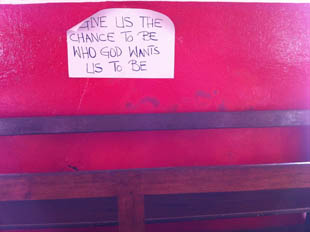
Sign found taped to the wall inside a Liberian church. Photo: Laura McClure
Editors’ Note: Laura McClure is traveling in Liberia this month on an IRP Gatekeeper Editors trip organized by the International Reporting Project (IRP). The IRP, formerly known as the Pew International Journalism Program, is a nonprofit dedicated to filling gaps in American media coverage of international issues.
As always, Mac’s got you covered on human rights issues. But this month, I’ll be joining her in blogging on the Africa front. I’m here in Liberia for a few weeks—along with 10 US-based editors from outlets such as NPR, the Washington Post, and The Root—to see how a country rebuilds after a gruesome and protracted civil war. Soon I’ll introduce you to born-again warlords, former child soldiers, General Peanut Butter—a potential 2011 presidential candidate here—and Jewel, the ex-wife of charismatic war criminal Charles Taylor. You’ll also meet some of the inspiring women who brought peace to Liberia and Ellen Johnson Sirleaf, Africa’s first female president. Gods and WiFi willing, I’ll be blogging once daily about all this plus health, forced labor, and whatever shiny culture factoid I pocket that day in Africa. Got a question for me about corporate social responsibility in Africa? Leave it for me in comments—I’ll be reading them each day.
MONROVIA, Liberia The first thing you notice is the weight of the air, heavy as a hand on a damp night. Second comes the smell: Ocean breeze and burning trash, tropical flowers, raw sewage. Then sound: taxi horns honk, crickets and frogs, low voices speaking African languages and English. Everything is muffled by the soupy air.
I write this in a hotel room with my head lamp looped around my neck, off but ready, in case the lights go out again. Though the Cape Hotel has good WiFi, magnificent feats of ongoing electricity are still rare in Liberia, a fragile country whose capitol is either powered by generators or not at all. Nothing’s darker than a night road in Monrovia; no streetlamps, only rare lights in houses, the occasional car. Here in Room 222, a Stephen King movie was just starting when Teddy, a smiling Cape Hotel employee, flipped on the TV to demonstrate how well it functioned at the same time as the air conditioning, the lights, and the fridge. Later I unplugged every appliance I could reach. (Sorry, Teddy!)















